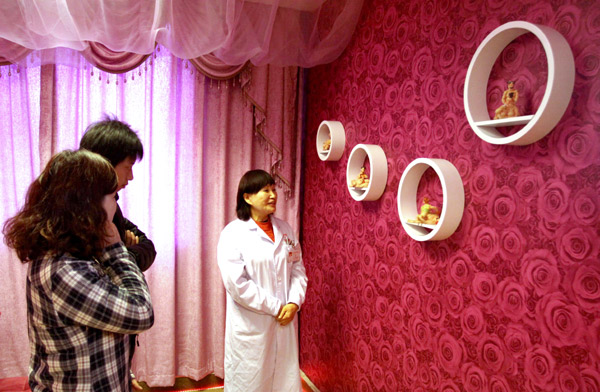Big implications of fewer little ones
By Tiffany Tan (China Daily) Updated: 2014-04-27 08:42China's fertility rate is plummeting, causing concerns among parents and experts. Tiffany Tan explores why and what it means for the aging country.
 |
|
Wuhan Songziniao Infertulity Hospital establishes the "bridal chamber" for couples expecting a child. Special facilities and decorations are installed to help fertilization. Sun Xinming /For China Daily |
Linlin injected her upper arm with a fertility hormone every morning for two weeks.
|
Fact Box Every day, at least 1,5000 people line up to see fertility doctors at Peking University Third Hospital, where the Chinese mainland's first test-tube baby was born in 1988. The success rate for IVF treatments at Peking University Third Hospital is 50 percent for women ages 25-35. The rate drops to 30 percent for those 36-40 years old and to 10 percent for those beyond 40. In 2010, an estimated 48.5 million couples worldwide were unable to have a child after five years together, according to a United Nations study. China has the world's largest population of seniors, with 194 million people at least 60 years old, the China National Committee on Aging reported in 2012. This age group is expected to grow to 243 million by 2020, and by 2050 one-third of the country's population will be older than 60. |
The 34-year-old nurse from northern China, who refuses to give her full name for privacy reasons, has wanted a baby since 2011. She had an ectopic pregnancy the same year and has been unable to conceive since.
"My body can't take it anymore, and there has also been a lot of psychological pressure," Linlin says in a phone interview.
"I'm worried I'm going to have another abnormal pregnancy."
After marking their ninth wedding anniversary still childless, Linlin and her husband decided to try IVF - a medical procedure in which mature eggs are removed from her body, fertilized with her husband's sperm and inserted into her uterus for normal development.
The couple is expecting to spend around 40,000 yuan ($6,400) on their first try, while knowing that some families have shelled out five times as much with no baby to show for it.
According to the China Population Association, at the end of 2012, 12.5 percent of mainland Chinese of childbearing age - or 40 million people - had been diagnosed with infertility. (Infertility is clinically defined as failure to conceive after at least 12 months of unprotected sexual intercourse.)
Two decades earlier, China's infertility rate was only 3 percent. What has caused the spike in numbers?
It's the decision to delay marriage or parenthood, especially among career-driven urbanites, say reproductive specialists and population researchers. A woman's fertility begins to decline in her early 30s and drops sharply after 35.
Although the average age of first marriage in China is 25 for men and 23 for women, in big cities such as Shanghai, it is 34 for men and 31.6 for women. The data, released by the Shanghai Civil Affairs Bureau in February, show an increase of 1.3 years for both sexes within just one year.
Other major factors experts cite are more sedentary lifestyles, which lower the quality of egg and sperm cells. There is also the rise in sexually transmitted diseases, which can damage men's and women's reproductive systems.
Doctors are similarly worried about the effects of induced abortions, which have become widespread in China as a method of family planning. Data released by the National Health and Family Planning Commission last year show that some 13 million abortions are conducted in China every year - or 25 abortions per minute.
"Don't get an abortion again and again," says Zhai Guirong, director of the obstetrics and gynecology department at Beijing Obstetrics and Gynecology Hospital.
"This can thin out the uterus lining and block the fallopian tubes."
- More female officials caught in corruption
- Whampoa veterans recorded with glory
- Police bust 9 terrorist groups in Xinjiang
- Knife-wielding attackers seized in Xinjiang
- New regulation leads to drop in petitioned cases
- Hunan plant shut as probe into lead poisoning begins
- Police boost efforts to combat gambling
- Project offers jobs openings to legal experts
- Experts: Dog meat festival 'illegal'
- Nation looks to upgrade
pipeline networks






